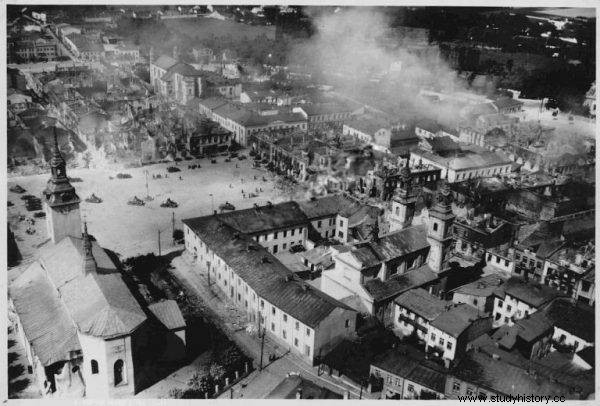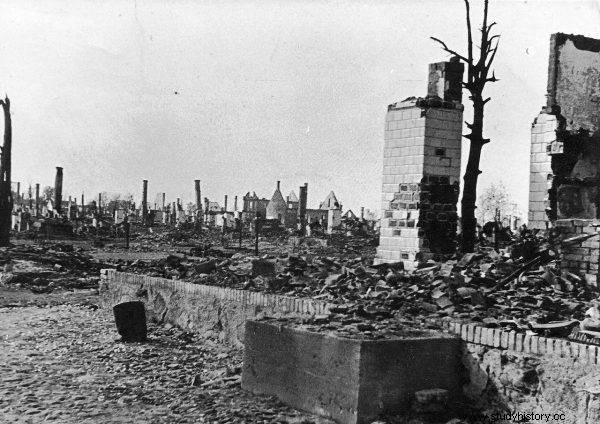Does Germany owe us hundreds of billions of euros or not a penny? Does Poland have grounds to demand compensation for losses suffered in World War II? Is it just a media and political topic? We check documents and listen to experts.
The Institute will be looking for legal ways of pursuing court claims against the German occupier during World War II. The prime minister announced that the parliamentary commission to investigate the war damage, established in 2017, would complete work on its report in February next year. "The decision on what, when and how we will do with this report has yet to be made." But we are preparing everything to present this report to the world, ”announced Prime Minister Morawiecki.
Political continuity
In 1998, on the initiative of the Senate Legislative Committee, a conference was held on "Restoring legal continuity between the Third Polish Republic and the Second Polish Republic - implications and consequences". The conference summary said:
Prof. W. Łączkowski, who argued that after 1939 there was a non-sovereign state in Poland. In his opinion, the present, sovereign legislator may recognize part of the law of that time, removing from it provisions that the professor described as "wicked". So the parliament or the Constitutional Court should review all these provisions on the basis of ethical premises resulting from the universal Christian system of values.
A different opinion was expressed by prof. A. Łopatka:The Polish state was reborn in 1918 and continues to this day. It did not lose its continuity even during World War II, because there was a Polish government in exile and Polish armed formations abroad. After 1944, he was in power, according to him, by a "people's socialist" government, and after 1989 by a new "bourgeois" government. Therefore, the number III assigned to present-day Poland is "a freely accepted legal fiction".

The first German bombs fell on Wieluń during World War II. The defenseless city was severely damaged.
Anna Zagórska, a political scientist, also emphasized in an interview with us that "legal continuity between the Polish People's Republic and the Third Republic of Poland was maintained" .
- Otherwise, all legal acts enacted in the times of the Polish People's Republic, and still functioning today, should be questioned. This, in turn, could create many unnecessary precedents, adds Zagórska.
Experts who believe that Poland should not demand reparations nowadays refer to the legal continuity between the People's Republic of Poland and the Third Republic of Poland.
International Agreements
As he emphasizes in his excellent book "Historia Polski 1914-2015" , Wojciech Roszkowski:
According to the Potsdam resolutions, Poland was to (...) receive compensation through the USSR. The Kremlin ruled that $ 6 billion must be deducted from the sums owed to Poland as the difference in the value of assets acquired by Poland in the West and lost in the East.
When Mikołajczyk pointed out that the Russians had taken most of the movable property and livestock from the Recovered Territories, Molotov stated that the value of these devices was only $ 500 million. The Kremlin has agreed to give Poland its share of reparations 15% of all supplies from the Soviet occupation zone and 15% of assets from the western occupation zones of Germany.
Then, after receiving a percentage of the compensation from the USSR, Poland, on August 23, 1953, renounced its war reparations against Germany. The statement was sent to the government of the GDR because Warsaw did not maintain diplomatic relations with West Germany. Paragraph 5 of the above-mentioned statement stated that "in order to settle the German problem and in recognition that Germany had largely settled its war indemnity obligations, the Polish government waived on January 1, 1954 the payment of war indemnities to Poland." According to many lawyers, political scientists and politicians, this provision exhausts the possibilities of demanding war reparations from Germany.

The decision to abandon the reparations was probably made over Bierut's head.
In subsequent years, both sides repeatedly emphasized that the issue of compensation had been settled, and moreover, the German government paid compensation to Polish citizens injured by the Third Reich. In the years 2001-2006, 484,000 people received a total of three and a half billion zlotys.
Controversy
“There was a strange situation that on Sunday, August 23, 1953, at 7.30 pm, there was a meeting of the Council of Ministers, which lasted for half an hour and there is only a protocol from this meeting. There is no decision, no official act, just a protocol that everyone has unanimously agreed to waive the reparations. This protocol is signed only by Bierut, by no one else. This may mean that this document could be forged, that it could be submitted to Bierut for signature and was concluded under pressure, ”said MP Mularczyk on 5 August 2017. In saying this, he was probably based on an expert opinion prepared 13 years ago.
In 2004, the Parliamentary Office of Studies and Expertise prepared a document by Stefan Hambury, a lawyer, in which he emphasized that the post-war diplomatic relations between German states and Poland were quite confusing and full of ambiguities, which could be used by both sides of the dispute. He suggested that contracts and declarations might contain errors that could undermine their legality. Hambura believes there is evidence of pressure from Moscow for Poland to waive the compensation. He suggested that evidence of this "should be sought in the archives of the Polish United Workers' Party and in Moscow."
The trail of diplomatic ambiguities was followed by Grzegorz Kostrzewa-Zorbas, a political scientist and diplomat, who in 2014 asked the UN whether its archives contain a document confirming Poland's renunciation of war reparations. It turned out that there is no such document. On this basis, Kostrzewa-Zorbas suggests that a document that has not been certified by the United Nations under international law does not exist.
- "The case of compensation for Poland was treated by the Big Three as an internal issue of the USSR," says Prof. Roszkowski, an outstanding 20th century history author and author of the work "Historia Polski 1914-2015".
- "This matter should be constantly raised to show how the Commonwealth, as an ally in the anti-Nazi coalition, was then treated by the Allies, especially by the USSR," he adds.

Poland's losses during World War II were proportionately the largest of all countries participating in the struggle.
Meanwhile, Germany is firmly defending its position. “The issue of German reparations for Poland has been finally settled in the past - legally and politically. In 1953, Poland bindingly, and this concerned the whole of Germany, resigned from further reparations for the whole of Germany and repeatedly confirmed it in the following period, "said Ulrike Demmer, deputy spokesman for the German government at a press conference in 2017.
Undoubtedly, attorney Hambur was right when he said that the confusing legal aspects will cause that the issue of compensation will be raised for many years to come, and the parties will use the ambiguities to their advantage.
Bibliography:
- Wojciech Roszkowski, History of Poland 1914-2015 , PWN 2017.
- Summary of the conference entitled Restoration of legal continuity between the Third Republic of Poland and the Second Republic of Poland - implications and consequences , Senat.gov.pl.
- Stefan Hambura, BSiE Expertise No. 302, IP-105 P, War reparations in Polish-German relations, sejm.gov.pl.
- PAP reports from 1 August, 2 August and 5 August for:fakty.interia.pl.
